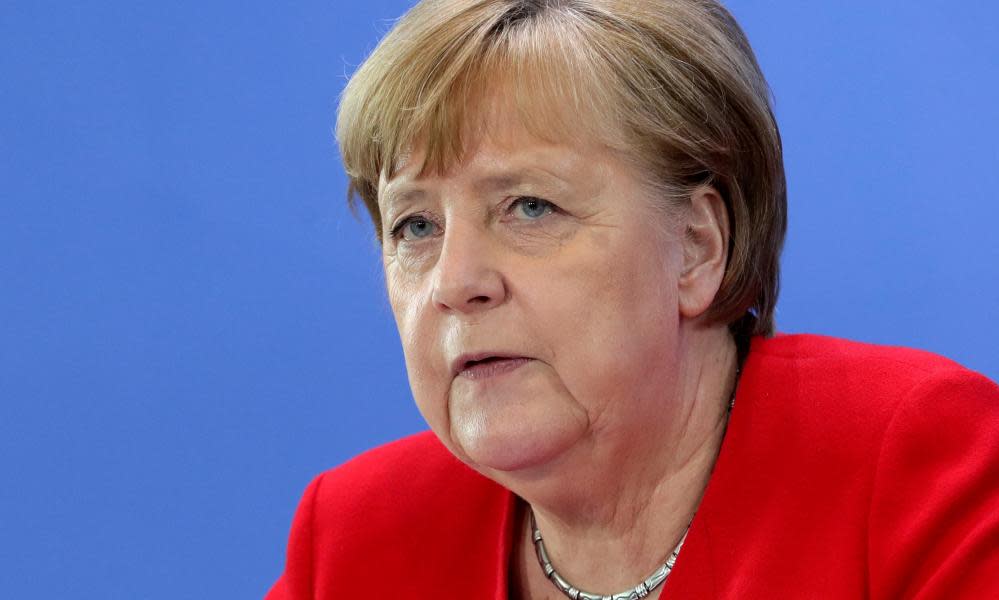Merkel intervenes in damaging row between Germany and Brussels

Angela Merkel has stepped in to try to find a way out of a damaging clash between Germany and Brussels after the EU threatened to bring infringement proceedings over a ruling by the country’s constitutional court.
The German chancellor stressed that the dispute was solvable, after the European commission president, Ursula von der Leyen, issued an unusual statement on Sunday warning of possible legal action against Berlin.
Von der Leyen, a former German defence minister, made her announcement after Germany’s federal constitutional court set aside a 2018 European court of justice (ECJ) ruling and questioned the legality of a European monetary policy designed to maintain stability in the eurozone.
Unless it is proved proportionate, the judges said the Deutsche Bundesbank, the country’s central bank, must stop cooperating with a European Central Bank (ECB) scheme that has been bulk-buying government bonds within three months.
The constitutional court’s ruling amounted to the first time a national court has declared an ECJ judgment invalid, posing a direct threat to the uniform application of EU law.
The ECJ’s ruling in 2018 that the bond buying was legal was described by the German constitutional court last week as “not comprehensible”.
An EU official said: “This raises a couple of fundamental issues … first is the authority of a judgment of the European court of justice which has definitely ruled on the validity of the decisions of the ECB. This goes to the very basis of the European Union. The European Union is based on law, on agreement, on the common rules we have.”
The German finance ministry said on Monday that the bank would comply with the constitutional court’s ruling and denied claims that the ECJ’s authority had been challenged. “We will meet these requirements,” a spokesman told a regular government news conference.
Experts have said the ruling risks undermining the ECB’s authority and its ability to protect the eurozone’s financial system during a crisis such as the one triggered by the coronavirus pandemic.
The ECB has injected billions of euros into the reserves of high street banks across the eurozone’s 19 member states since 2014 to encourage them to lend to small businesses. The bank’s president, Christine Lagarde, said last month that the pandemic meant a fresh round of stimulus was necessary.
Merkel told her party members on Monday that the issue had been complicated by comments from Poland’s prime minister, Mateusz Morawiecki, welcoming the German ruling as “one of the most important rulings in the history of the European Union”.
The ECJ recently ruled that changes by the Polish government to the retirement age of the country’s judges and the granting of power to the government to choose which members of the judiciary could continue in post were contrary to EU law.
Merkel told her party members that a clash with Brussels could be avoided if the ECB illustrated the necessity of its bond-buying scheme.
An infringement proceeding, if launched, could take years to come to fruition and could ultimately lead to huge fines for contravening EU law.
A commission spokesman said dialogue had been opened but declined to offer a time by when the launching of such a measure would be agreed upon by the commission’s college of 27 commissioners.
He said: “The whole aim of the commission is to find a solution to this kind of situation. We still have an analysis that is ongoing on the 100-page ruling of the German constitutional court and therefore the commission will have to decide when it feels it has all the elements at its disposal to come to a conclusion as to whether next steps are warranted and which next steps these should be.”
The EU’s watchdog, meanwhile, has ruled that the European Banking Authority should have barred its executive director from becoming the head of a banking lobby.
The European ombudsman said there had been “maladministration” in Adam Farkas’s move to head the Association for Financial Markets in Europe.

 Yahoo News
Yahoo News 
